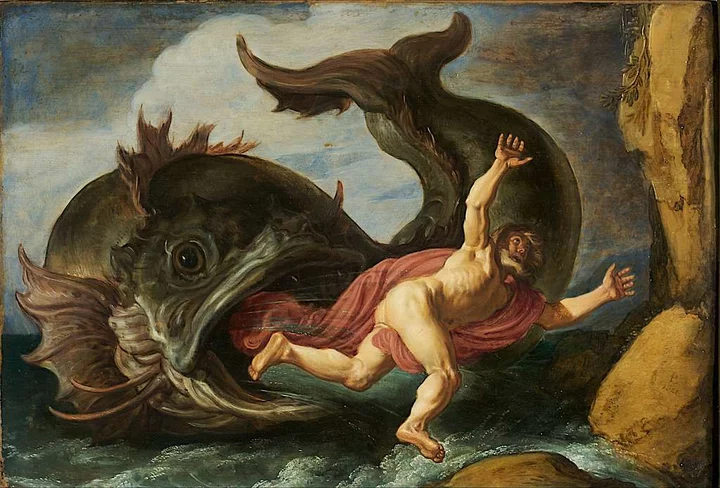Painting: Pieter Lastman. Public domain.
Jonah is a short story in the Bible consisting of four small chapters. If you’ve heard about this story, I’m sure you’ve known it to be about a guy and a whale, even inspiring Geppetto’s experience of Monstro, the enormous whale in Pinocchio’s story. It is often relegated to cartoonishly drawn nursery room walls in old Church buildings or into a beloved VeggieTale’s movie. But, as with most ancient stories, I believe this one has a lot to teach us beyond the familiar illustrations of a guy and a whale.
The story of Jonah starts with a prophet being called by God to go to Nineveh. While this might seem like no big deal, Nineveh was the capital city of Assyria and was known for skinning their enemy alive, flaying them in front of their sobbing families. They were known for making their enemy’s loved ones carry the decapitated heads of husbands and fathers on a pole, parading them around the destroyed city. More than likely, Jonah had literal friends or family members who’d been violently oppressed or murdered by the Assyrian army. This was not some simple ask.
God tells Jonah to preach against the great city of Nineveh. Most of us might assume the language of “against” would be a warning of terror with fire and brimstone raining destructively down on these evil peoples, but Jonah understands God’s heart better than most of us and assumes this message is one of undeserved compassionate mercy.
Jonah’s like, nope, and flees in the opposite direction on a boat.
A massive storm comes up and everyone on the boat thinks they’re going to die because someone must have done something wrong to make the gods this angry. After they discover it’s Jonah, Jonah jumps overboard. As he’s sinking under, he’s swallowed by a big fish. The story tells us he’s in this big fish for three days and prays to God, who has mercy on him, and the fish spits Jonah out on land. Jonah journeys toward Nineveh, where he says five words about God’s mercy. Everyone repents, and even the animals repent, and the people wear sackcloth. Jonah becomes furious with God’s mercy for these people, so he sits under a tree and asks to die.
And the story ends with God asking Jonah a question: “Should I not be concerned about these humans and animals?”
That’s it.
Four small chapters that we might easily assume is about a whale. This big fish is only mentioned twice in the first chapter, and yet it’s often the focal point in our imaginations. The whale is not even the point of the story! Unfortunately, I’ve found some church people make it the point of the story, creating some litmus test whether you believe in miracles or not. Like, if you don’t believe Jonah was swallowed by this whale, then you probably don’t believe Jesus was raised from the dead. The whole story, then, becomes about a whale. We do this a lot, don’t we? We tend to place our attention and focus on the parts of our life or the parts of our story that are not the point?
There are parts to our stories that feel insurmountable. Things we’ve been through that feel impossible, like being swallowed by a whale. I know you’ve been through some shit and you’ve survived or are surviving terrible things. But that’s not the whole story.
What if I focused all my attention on not being able to get pregnant and the deep sadness that infertility has caused? When we found out we would never have biological children, I was devastated. Infertility didn’t fit my plan for my life and it began to unravel any expectation for my future where I was angry and frustrated at God.
Infertility is forever part of my story, and while that’s sad, it’s not my whole story and it is certainly not what my story is about.
I am more than “Bethany and infertility,” just as this biblical story is more than Jonah and a whale. I think there’s a bigger story happening in our lives. When we get caught up on that one thing, we can miss the good stuff. Sometimes we don’t know what to do with such a compassionate God. We look towards the seemingly impossible parts of our lives and make them into the story. We take the big things—the things that aren’t meant to be overlooked but certainly not meant to be obsessed over—and we make them into a whale that is difficult to see past.
What whales in your story have you been focused on that have made it hard to see past? Infidelity? Divorce? Illness? Childhood trauma? Poverty? Bullying?
Friends, the whale is not the whole point of this story. The whale in your life that you’ve given so much attention to is not the whole point of your story. It’s in your story, but it’s not your full story. You are more than that whale. Your marriage is more than that whale. Your life and ministry and family and future are more than that whale.
And this story is so much more than Jonah and a whale.
It’s about a God who pursues Jonah, who pursues our enemies, who pursues you and me. It’s about a God who still chooses to work within the situations and contexts we find ourselves in or the ones we’ve made for ourselves. It’s about a God who never gives up and will always have a final word of compassion and grace in every person’s life.
###
Bethany Cseh is a pastor at Arcata United Methodist Church and Catalyst Church. Follow her on Instagram.

CLICK TO MANAGE